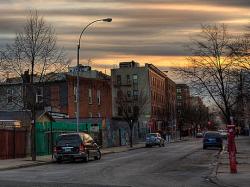It Takes More Than A Produce Aisle To Refresh A Food Desert
February 11, 2014 | 1 min to read

In inner cities and poor rural areas across the country, public health advocates have been working hard to turn around — neighborhoods where fresh produce is scarce, and greasy fast food abounds. In many cases, they're converting dingy, cramped corner markets into lighter, brighter venues that offer fresh fruits and vegetables. In some cases, they're building brand .
"The presumption is, if you build a store, people are going to come," says , professor in the departments of sociology, anthropology and demography at Penn State University. To check that notion, he and colleagues from the London School of Hygiene and Tropical Medicine recently residents of one low-income community in Philadelphia before and after the opening of a glistening new supermarket brimming with fresh produce.
What they're finding, Matthews says, is a bit surprising: "We don't find any difference at all. … We see no effect of the store on fruit and vegetable consumption."
To read the rest of the story, please go to: NPR
